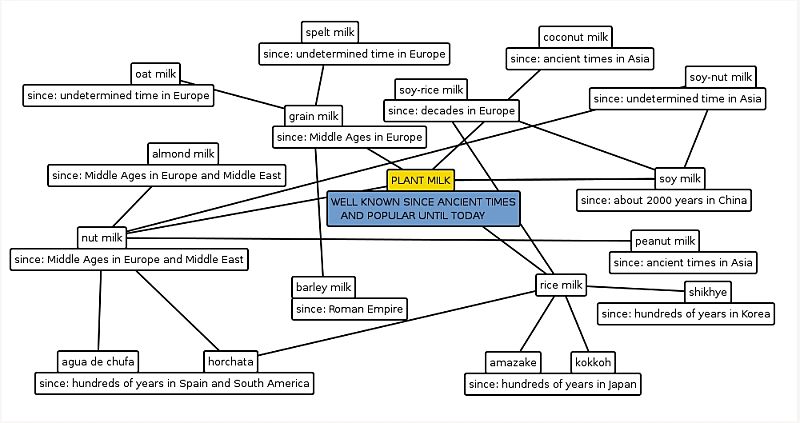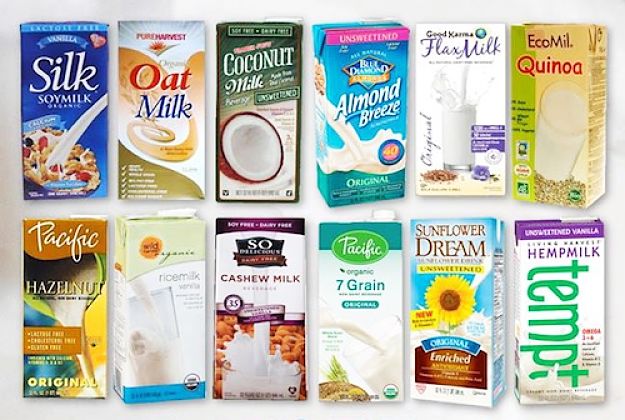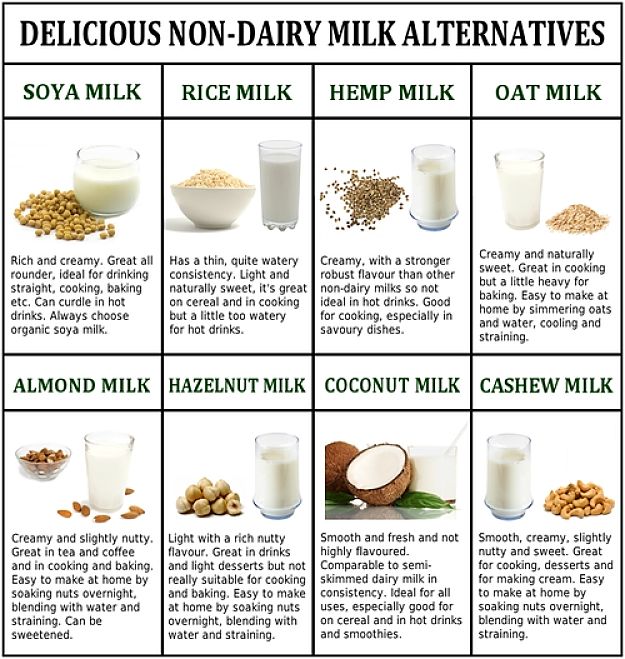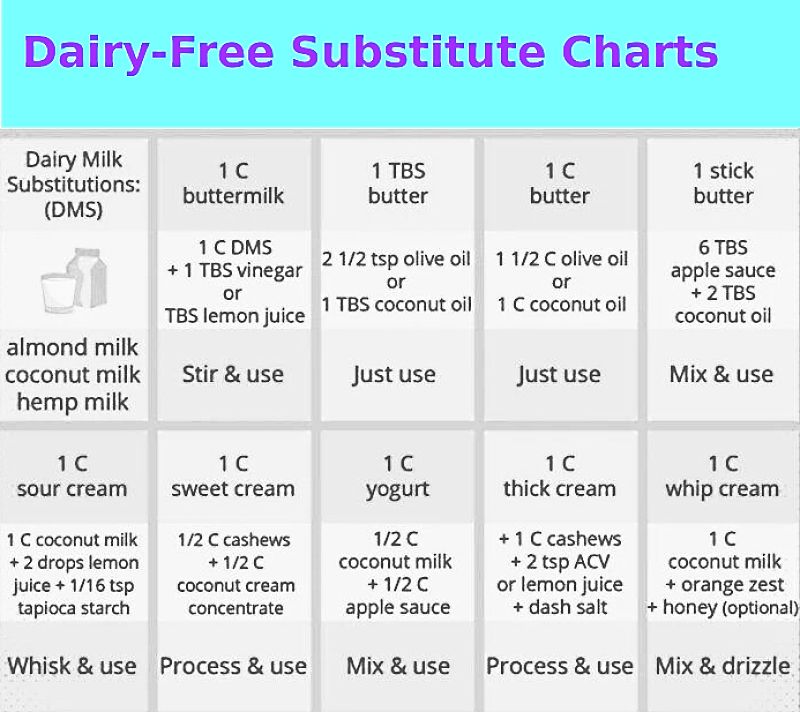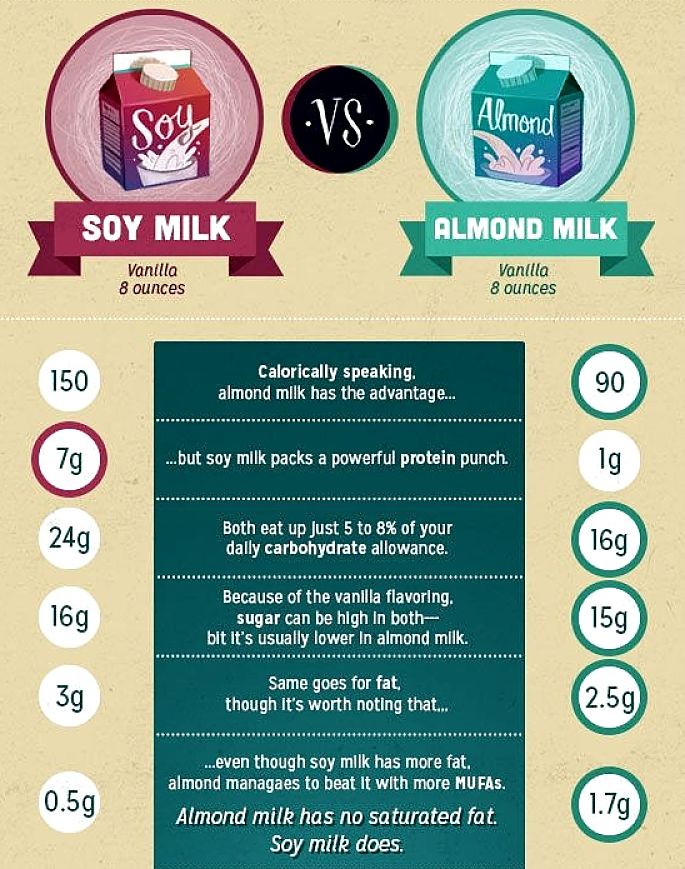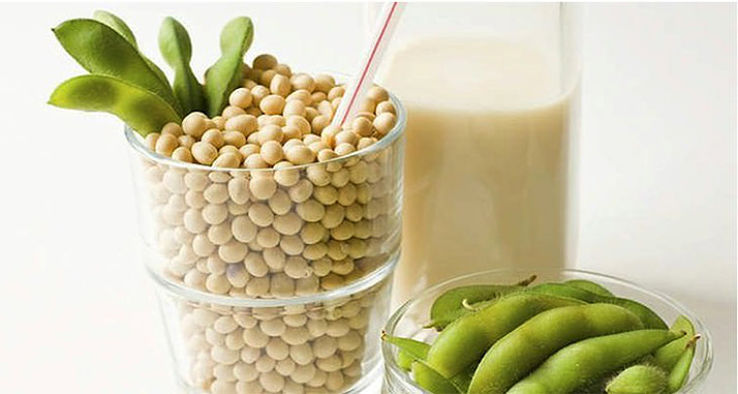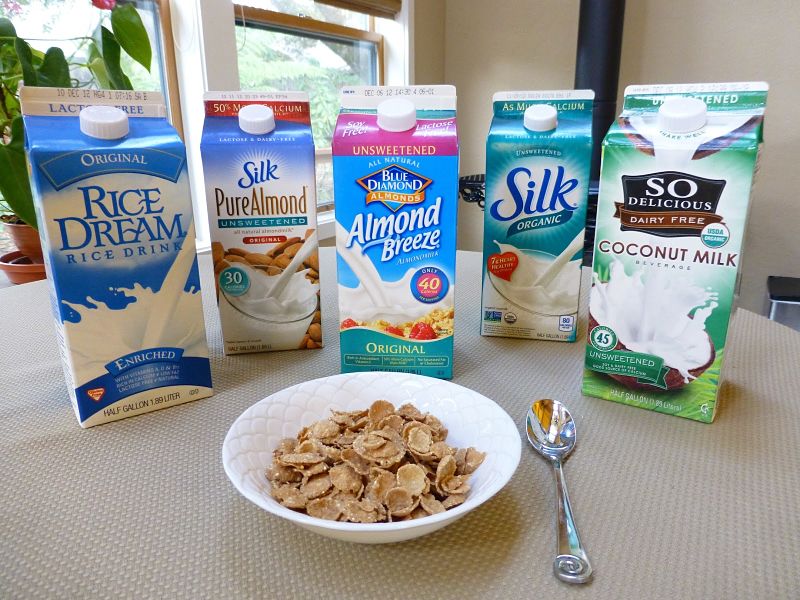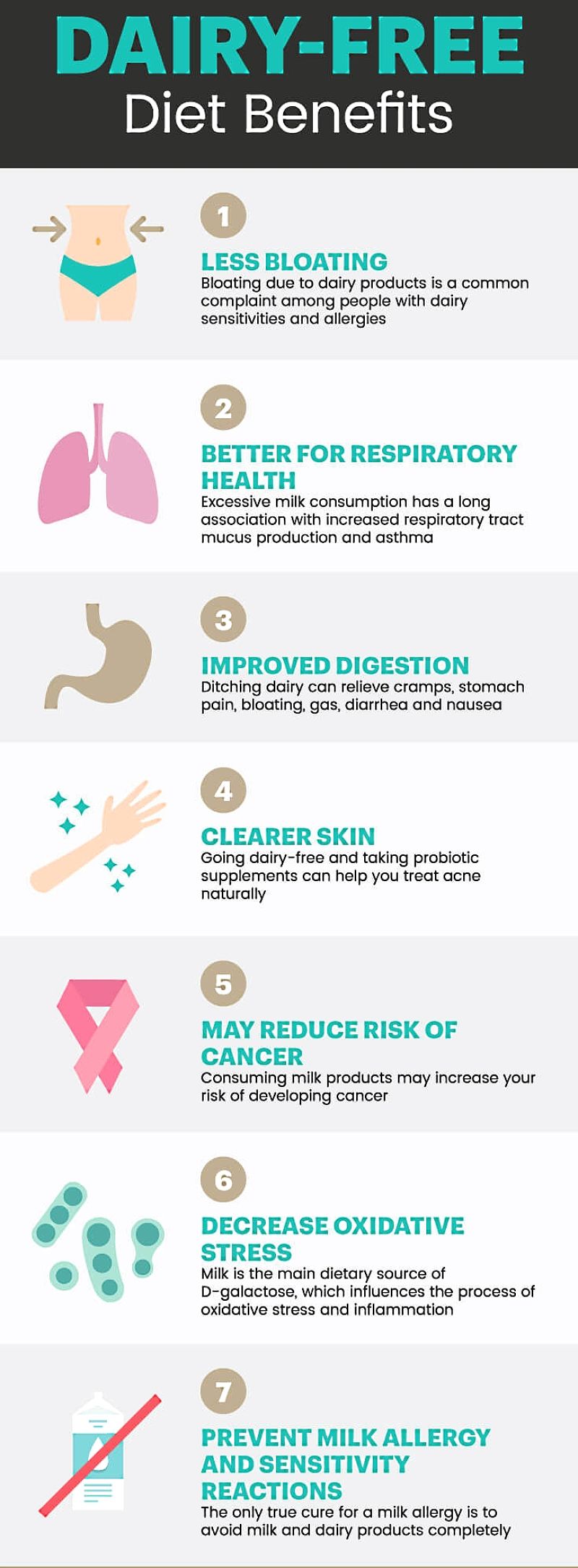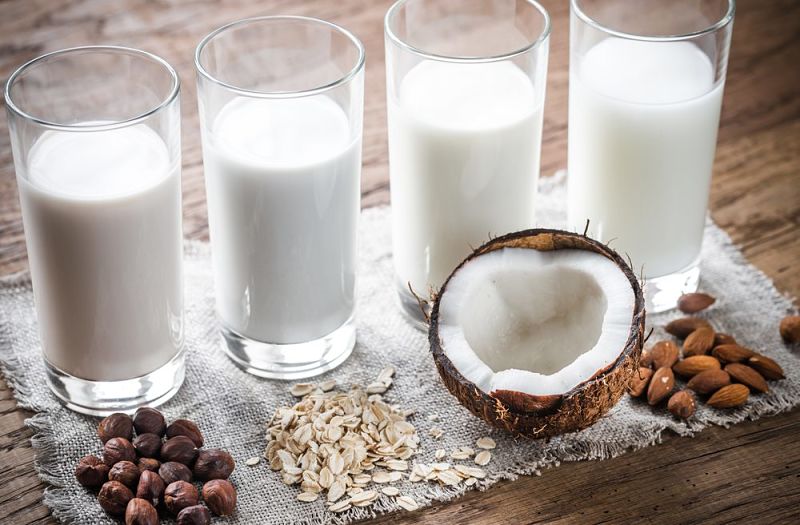Best Lactose Free Milk Substitutes for Vegans - Remedy for Lactose Intolerance
Many people decide to stop drinking cow’s milk and other dairy products for a variety of reasons.
Vegans can’t drink milk because it's an animal product. Some vegetarians also don’t drink milk either.
Others have various dairy allergies or lactose intolerance.
Others simply decide to eliminate milk for various dietary reasons, perhaps related to weight loss or general well being and health.
But what are the best alternatives? How can you choose the best substitutes for milk for various purposes from adding a dash of whitener to your coffee, something to add to your muesli at breakfast, what to use in cooking as well as yogurts and cheese?
There are a whole host of options available. This article provides nutrition information, taste and usefulness comparisons for the major milk substitutes that are lactose free. This includes milk substitutes entirely derived from plants.
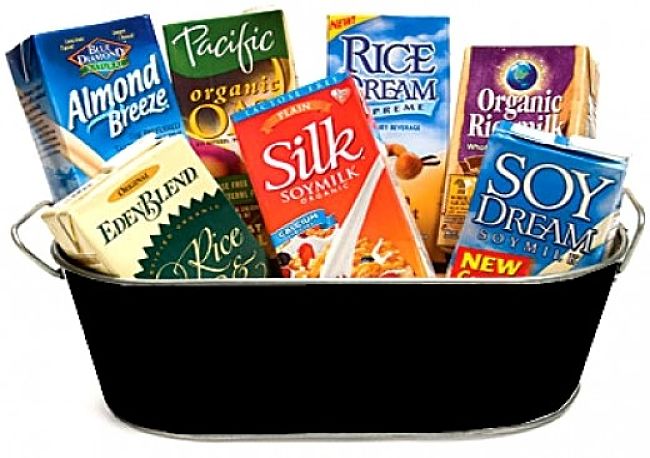
What Milk Substitutes are Available?
Goat Milk, Sheep Milk and Other Ruminant Milk
These milks are not really an alternative for vegans and people with lactose intolerance. They contain lactose unless its removed with an enzyme supplement. Sheep and goats milks (and other ruminant milks) have very similar proteins to that found to cow's milk and are likely to produce the same allergy response.
Lactose-Free Milk
An enzyme (lactase) can be added to regular milk that converts lactose into simple sugars. Lactose-free milk can be purchased. You can also buy a supplement containing the enzyme to do it yourself.
However, while Lactose-free milk may be a solution for lactose intolerance it does not change the allergic response to other components in the milk. The proteins that triggered the allergic response are still there and so it does not alleviate dairy allergies.
In terms of taste lactose-free milk is generally very similar to regular milk, tough perhaps a little sweeter.
Soy Milk
The various versions of soy milk are the most popular and widely available dairy-free milk substitute. Soy milk can be used virtually anywhere that milk is used as a drink, for adding to cereals and for baking and other cooking uses. It can also be used to make yogurt, custard and ice cream. Soy milk has a strong, and very distinct taste that some people like and others dislike.
Almond milk
Almond milk is perhaps the second most widely available and popular milk substitute and is arguably the best of the nut milks. Almonds are very healthy nuts. Nut milks can be used as a universal replacement for soy milk and many people prefer the taste of nut milks. Nut milks are expensive are relatively high in fat, but also have protein and fiber. Almond milk can be used for baking and it adds to the flavor. Some people like the taste better in coffee, or in cereals although personal tastes vary. Allergies to nuts are common and need to be checked before use.
Other Nut Milks - Cashew, Brazil, Pistachio, Hazelnut, Macadamia Nuts, others
You can make milk substitutes from virtually any nut. A general nut milk recipe is provided at the end of the article.
Rice Milk
Rice has a much lower allergic response incidence than to cow's milk, soy and nuts and this makes it a good first choice in families with a history of allergies.
Rice milk is quite sweet, but it is very watery and it is not suitable for most cooking and may other uses. It has low fat, but also has very low protein and fiber contents. It can be uses as a drink and for pouring on cereals, but it is a poor nutritional replacement for milk, unless it contains a range of supplements.
Hemp Milk
This a recent addition to the range of milk alternative products available in various stores, but it may be hard to find. Its properties lie somewhere between soy milk and rice milk, being watery and having a low protein level. It can be used for some cooking applications, but not for sauces requiring a thick texture.
Oat Milk
Oat milk has a relatively mild, nutty taste and is generally not too watery. It is ideal for drinks, many breakfast foods, and hot and cold cereals. Oat milk has a moderate level of protein and is better for cooking than hemp or rice milk, but is not suitable for all cooking uses. People with allergies to wheat protein and celiac disease may also be allergic to oats. Some people may also be sensitive to the avenin protein that is found in oats and other grains.
Criteria Used to Choose a Milk Substitute
A table summarizing the nutrients in the most popular milk substitutes is shown below
Taste - This is decision is very subjective of course, and so it is a good idea to buy some of each and to try them for various uses. Almond milk has a nice, sweet taste but it's probably less suitable for savory dishes and is probably not great in savory dishes. Soy milk can curdle at high temperatures. Many people don't like the taste of soy milk
Calories - This can vary with many light versions and non-fat versions being available. See the table below for the details. Soy milk 100 Calories per cup) and hemp have the highest calories, being similar to the concentration for cow's milk (150 Calories per cup). The lowest are Almond milk (55 calories) and Coconut milk (80 calories).
Protein - Soy milk contains about 6 g per cup compared with cow's milk as 8 g per cup. The lowest are Coconut, Almond and Rice milk with only 1 g per cup. Intermediate levels occurred for Hemp (2 g per cup) and Oat (4 g per cup) and Hazelnut (2 g per cup)
Calcium and Vitamin D - Soy, Rice and Almond milks contain much less vitamin D and calcium as cow's milk. Many Soy milk products are fortified with vitamins A and D, and calcium). Low calcium is a major disadvantage of switching to milk substitutes.
Sodium - Cow's milk contains at 130 milligrams per cup - very similar to soy milk at 120 milligrams per cup. Most of the other milk substitutes have less sodium - almond milk has 150 milligrams and rice milk contains 80 milligrams.
Fat - Most of the milk substitutes have less fat per cup than cow's milk (8 g; 5 g saturated). Skim milk has no fat. The milk substitutes with the highest fat content are Hemp (6g; 0.5 saturated) and coconut (5g; 5g saturated). Those with the lowest fat contents are: Rice and Oat ( 2g; 0g saturated); Almond (2.5g; saturated); Soy (3g; 0.5g saturated).
Raw Almond Milk Recipe ( Can be used for other Nuts as Well)
- 1 cup raw almonds
- 4 cups water, plus additional water for soaking the nuts)
- sweeteners, spices and other ingredients to taste
The almonds overnight in a container of water at room temperature. Strain the almonds and rinse with water until the drain water runs clear. Transfer the nuts to a blender and add 4 cups of water. Blend the mixture on high for about 5 minutes. Then add the sweetener and spices, plus salt to taste. Many people prefer to sieve or filter the nut milk through very fine muslin, but this is not necessary for all uses. Any foam that forms will quickly disappear on standing.
Comparison of Nutrients for Common Milk Substitutes with Skim and Whole Milk
|
Type of Milk (Serving 1 cup)
|
Calories
|
Fat
|
Saturated Fat
|
Protein
|
Carbs
|
Sugars
|
|---|---|---|---|---|---|---|
|
Whole cow's milk
|
150
|
8 g
|
5 g
|
8 g
|
12 g
|
12 g
|
|
Skim cow's milk
|
90
|
0 g
|
0 g
|
8 g
|
13 g
|
12 g
|
|
Soy, unsweetened
|
85
|
4 g
|
0.5 g
|
8 g
|
4.5 g
|
1.5 g
|
|
Soy, plain / original
|
100
|
3 g
|
0.5 g
|
6 g
|
12 g
|
7 g
|
|
Almond, unsweetened
|
40
|
2.5 g
|
0 g
|
1 g
|
3 g
|
1 g
|
|
Almond, original
|
55
|
2.5 g
|
0 g
|
1 g
|
7 g
|
6 g
|
|
Hemp, unsweetened
|
70
|
6 g
|
0.5 g
|
2 g
|
1 g
|
0 g
|
|
Hemp, original
|
120
|
6 g
|
0.5 g
|
3 g
|
15 g
|
10 g
|
|
Rice, plain
|
100
|
2 g
|
0 g
|
1 g
|
20 g
|
12 g
|
|
Oat, original
|
120
|
2 g
|
0 g
|
4 g
|
24 g
|
19 g
|
|
Hazelnut, original
|
110
|
3.5 g
|
0 g
|
2 g
|
18 g
|
14 g
|
|
Coconut, unsweetened
|
50
|
5 g
|
5 g
|
1 g
|
1 g
|
0 g
|
|
Coconut, original
|
80
|
5 g
|
5 g
|
1 g
|
7 g
|
6 g
|
